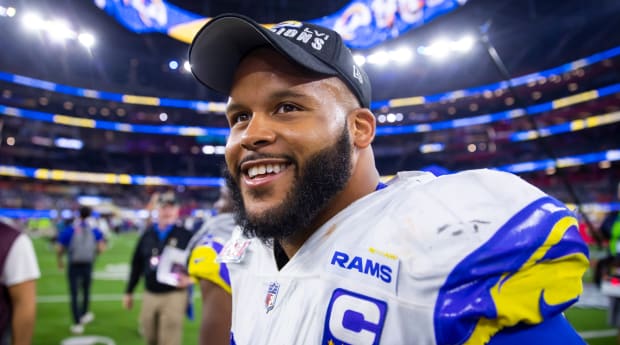Few nonquarterbacks are Aaron Donald, which is why the Rams’ defensive tackle became the first NFL player in history who doesn’t throw a football to sign a contract worth more than $30 million per season. The initial cash flow in Donald’s deal, according to several reports, is richer than that of both Patrick Mahomes’s and Josh Allen’s. God bless the Rams’ accounting department, which will soon resort to hiding cash under the jackets of older relatives en route to Switzerland to avoid the salary cap police.
Donald earned the money by being a generational talent. There is no one who can rush as effectively from multiple locations or command more double teams. The Rams can cause five offensive linemen and a tight end to bounce off each other and tumble like heels in a wrestling ring with just three defenders. They did it quite often during their push to the Super Bowl (watch again, if you have the chance, as the Arizona front five folded on itself during the Kyler Murray playoff pick-six, where two Cardinals boycotted their blocking duties to attend to the threat of Donald potentially, maybe rushing the quarterback). The Rams know they cannot reach that apex again if Donald were to walk away.
This is why what Donald did in the walk-up to the Super Bowl, and in the weeks afterward, was brilliant: He talked about leaving football. He talked about it kind of often. Reports of this first broke in the hours before the Super Bowl kicked off. He let the Rams know, through various winks and nods, that coming back meant he would have to be treated better than any defensive player in history.

Mark J. Rebilas/USA TODAY Sports
The Rams, clearly, received the message. Any other player who whiffs this kind of leverage should ditch the dated football tropes about being an ironman and securing your legacy and pay attention.
When players reach a certain level of mastery, it’s almost as if they become synonymous with their parent club. It’s like a more complicated and, in some ways, less satisfying marriage. It becomes a relationship of continued expectation. Of thankless life-giving. Every superstar who lasts roughly a decade in one city gets taken for granted, but synonymously guilted into forking over what is left of their physical health and available headspace. Along the way they are supposed to act in a way that facilitates team success by taking less. Think about how backward these arrangements become.
The exchange is supposed to be some kind of forever love. Some ingrained status as a franchise legend and, of course, a fast track to the Pro Football Hall of Fame and a padded seat in some broadcast booth somewhere.
The true coolness in Donald’s approach is the recognition that he was already there. Ninety-eight sacks for a defensive tackle, three Defensive Player of the Year Awards, more than 225 quarterback hits and a tenured place on the Associated Press first-team All-Pro squad, is most certainly enough. He did not need another Super Bowl ring, another All-Pro nod or another Telestrator-breaking moment of brilliance. The Rams needed him, needed his time, needed his efforts, all of his available thoughts and actions far more than Donald needed the Rams. In a true moment of Zen, he accepted walking away. In a true moment of fear, the Rams shook the place upside-down for cash and treated their star defensive tackle with the warmth and generosity of a Domino’s delivery person on 4/20.
All it took was realizing all that it really takes.
While Donald’s leverage plan isn’t for everyone, this moment should tug on the common-sense neurons of Derrick Henry, Cooper Kupp, Trent Williams, George Kittle, Travis Kelce, Justin Tucker and any of the dozen or so nonquarterbacks in the NFL who are truly irreplaceable at their position. We used to view only passers in this way, but as our understanding of the NFL grows and our availability to consume detailed game tape (save for the disaster that is Game Pass) increases, we have learned just how special and instrumental certain players are. Few of the people we mentioned will see their case as an all-time great improve substantially by tacking on more years, save, perhaps for Kittle, who is relatively young. All of them could probably hold out each year and capitalize on their franchise’s desperation, padding the difficult landing that is postfootball life.
In recent seasons we have also learned, somewhat, that the salary cap took on a certain mythos over the years as this preventative cloud handcuffing franchises from building a superteam. The truth is that owners can almost always make it work if they’re willing to spend. The truth is that some players don’t yet understand how quickly they could send a billionaire sprinting to their checkbook if given the opportunity. Kudos to Donald for proving that once again.
He is not the first person to use retirement as a pivot point in negotiations, but he is perhaps the most artful. The nonchalance with which he approached the end turned out to make the end far more lucrative.







